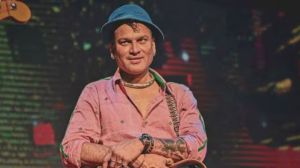‘I died a hundred deaths there but’
‘‘Sunny, I want my flag.’’ The military clip was unmistakable, this was authority speaking. Seconds after winning the si...

‘‘Sunny, I want my flag.’’
The military clip was unmistakable, this was authority speaking. Seconds after winning the silver medal at the men’s double trap shooting event at the Olympics, Major Rajyavardhan Singh Rathore asked national shooting coach Sunny Thomas for the Tricolour. Then, he wrapped it around himself and took it with him to the podium.
To the delirious Indians at the Markopoulo Shooting Centre, Rathore may as well have asked for the moon and have it delivered to him.
The Rajput soldier’s silver bullet had ripped through the defeatism and pessimism in the Indian contingent, as medal hope after medal hope faltered.
This was a day for Randhir Singh and Suresh Kalmadi, secretary general and president of the IOA, to savour the photo-op. This was a day for Priyaranjan Das Munshi of the Congress and Digvijay Singh of the Samata Party—the first is chef de mission of the Indian squad, the second president of the National Rifle Association—to hug and kiss like only political rivals can. This was a day for India to cherish.
This was Rathore’s day.
‘‘I was a little tense. I died a hundred times there but everything went off well,’’ he said. ‘‘I had worked hard for this moment… It is a great feeling, something very special.’’
The prize actually belonged to Ahmed al-Makhtoum of the UAE. You wouldn’t have noticed it in the shouting and screaming that accompanied Rathore’s silver. It completely drowned the applause for al-Maktoum, who shot 189 out of a possible 200, 10 points ahead of the next man.
That statistic hides a saga, of Rathore’s almost un-Indian refusal to baulk at the edge of glory. He was playing double trap, not ‘turn the other cheek’. Rathore’s event involves two clay saucers, called ‘pigeons’, being released simultaneously. The shooter has to hit both, getting one point for each.
After a three-round preliminary of 50 points each, Rathore entered the final at number five. Al-Makhtoum was well ahead at 144/150 but five others were bunched together in the 134-138 range.
The final was a 50-point test of resolve. Al-Makhtoum was flawless till shot 18, when he missed one pigeon, and simply ran away with gold.
Rathore, watched by dozens of hungry Indian eyes, fought a taut battle in the sterile, tension-packed atmosphere of the shooting range. Midway through the final he seemed to claw ahead of his three nearest rivals. Then he made a couple of mistakes, missed a pigeon each in two successive attempts.
Not one Indian moved, save the hapless Doordarshan reporter whose mobile phone buzzed continuously, with Delhi demanding to know what was happening.
For the others, it was simply too overwhelming, like the majestic silence before a conductor propels his orchestra into the symphony’s crescendo. This was the final frontier.
With two shots to go, and China’s Zheng just a single point behind him, Rathore knew he had to be spot on. His ‘‘steel nerves’’, to use Sunny Thomas’ expression, didn’t let him down, nor India. He got all four shots right in place. Second position was never sweeter.
A 9 Grenadiers officer, Jaipur-based Rathore took to shooting only four years ago, at 28, while attending an Army course in Mhow. Prior to that, he had done all his country had asked of him, including fighting terrorists in the Kashmir valley in the early 1990s, posted in Baramulla and Kupwara.
A bronze at the World Shotgun Championship in 2003 gave him his first taste of the cream. In effect, he put his Army career on hold to prepare for the big one. Since April, Rathore has been based in Italy, being coached by Australian Mark Russell, the Sydney Games double trap champion, working with ‘‘better facilities’’ and avoiding the media in the pressure cooker period before the Olympics.
A quiet, reserved man—family friend and the Indian cricket team’s media manager Amrit Mathur describes him as ‘‘a modest, model sportsman, almost like Prakash Padukone’’—Rathore inspires trust in those who know him and his abilities.
Mauro Perazzi, the Italian gun-maker whose eponymous company custom-makes Rathore’s guns—they cost 6,000 Euros each—was there to watch the Indian. ‘‘I knew he would get a medal,’’ Perazzi told The Indian Express, ‘‘I was certain.’’ It was easy for Perazzi to be happy. He made the guns for five of the top six, only al-Maktoum preferred Beretta, another Italian gun manufacturer.
Abhinav Bindra, who broke the Olympic record in the 10 metre air rifle competition yesterday but narrowly missed a medal, was equally clear about Rathore: ‘‘I was sure he’d win a medal. He’s mentally very, very strong.’’
Lost in the hockey hype and Anju adulation, the shooting team has been India’s pride at these Games. Three finals, one Olympic mark and one silver medal—suitably helped, this contingent could get home a bagful from Beijing 2008.
That, of course, is four years away. For now, India has to discover Rathore, the hero nicknamed ‘‘Chilly’’, who just walked in from the cold.
Photos




- 01
- 02
- 03
- 04
- 05



























